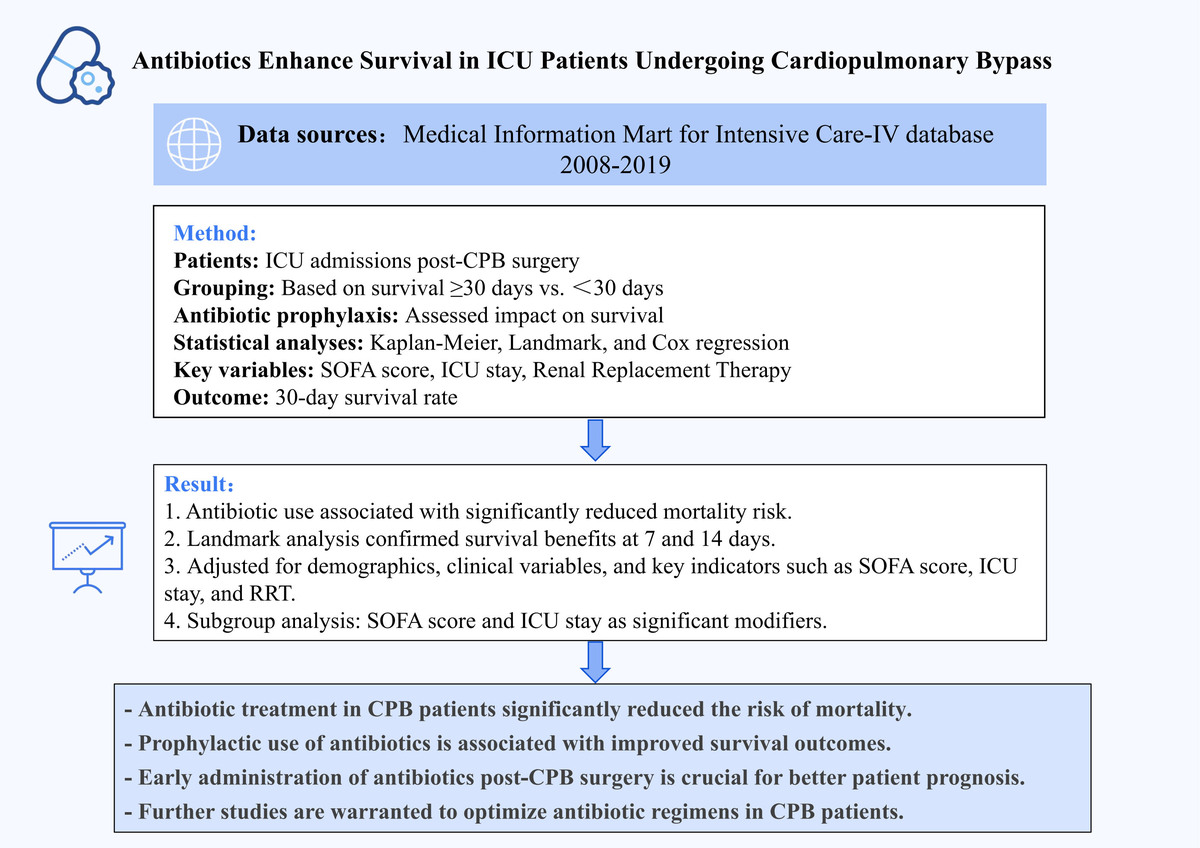Current issue
Archive
Manuscripts accepted
About the Journal
Editorial office
Editorial board
Section Editors
Abstracting and indexing
Subscription
Contact
Ethical standards and procedures
Most read articles
Instructions for authors
Article Processing Charge (APC)
Regulations of paying article processing charge (APC)
CARDIAC SURGERY / RESEARCH PAPER
Survival analysis of antibiotics in patients undergoing cardiopulmonary bypass in the intensive care unit: A study based on the Medical Information Mart for Intensive Care-IV database
1
The First Affiliated Hospital of Hebei North University, China
Submission date: 2024-07-18
Final revision date: 2024-10-28
Acceptance date: 2024-10-29
Online publication date: 2024-11-02
KEYWORDS
TOPICS
ABSTRACT
Introduction:
This project was designed to evaluate the influence of antibiotics on the survival of patients in the intensive care unit (ICU) undergoing cardiopulmonary bypass (CPB) treatment.
Material and methods:
This retrospective cohort study included data of 7,296 patients who underwent CPB surgery and were admitted to the ICU from MIMIC-IV database. Patients with CPB were grouped according to their survival time of more than 30 days or less after admission and whether antibiotics were used, with baseline characteristics analyzed. Survival differences were demonstrated by utilizing Kaplan-Meier (K-M) curves.
Results:
In CPB patients grouped according to survival time, great differences were detected in laboratory indexes, comorbidities, and treatment information. In terms of disease severity scores, vital signs, and comorbidity, there were notable differences in the data in CPB patients grouped by whether antibiotics were administrated. K-M curves manifested that the use of antibiotics substantially increased the 30-day survival rate of all CPB patients as well as CPB patients without sepsis complications. Landmark analysis indicated that the use of antibiotics greatly heightened the survival rates of all CPB patients and CPB patients without sepsis complications at 7 and 14 days after ICU admission.
Conclusions:
In CPB patients admitted to the ICU, the rational use of antibiotics for treatment and prophylaxis can remarkably minimize the risk of patient mortality. These findings proffer essential references for clinical practice, assisting healthcare professionals to better assess and manage CPB patients in the ICU and formulate appropriate treatment plans to improve patient survival rates.
This project was designed to evaluate the influence of antibiotics on the survival of patients in the intensive care unit (ICU) undergoing cardiopulmonary bypass (CPB) treatment.
Material and methods:
This retrospective cohort study included data of 7,296 patients who underwent CPB surgery and were admitted to the ICU from MIMIC-IV database. Patients with CPB were grouped according to their survival time of more than 30 days or less after admission and whether antibiotics were used, with baseline characteristics analyzed. Survival differences were demonstrated by utilizing Kaplan-Meier (K-M) curves.
Results:
In CPB patients grouped according to survival time, great differences were detected in laboratory indexes, comorbidities, and treatment information. In terms of disease severity scores, vital signs, and comorbidity, there were notable differences in the data in CPB patients grouped by whether antibiotics were administrated. K-M curves manifested that the use of antibiotics substantially increased the 30-day survival rate of all CPB patients as well as CPB patients without sepsis complications. Landmark analysis indicated that the use of antibiotics greatly heightened the survival rates of all CPB patients and CPB patients without sepsis complications at 7 and 14 days after ICU admission.
Conclusions:
In CPB patients admitted to the ICU, the rational use of antibiotics for treatment and prophylaxis can remarkably minimize the risk of patient mortality. These findings proffer essential references for clinical practice, assisting healthcare professionals to better assess and manage CPB patients in the ICU and formulate appropriate treatment plans to improve patient survival rates.
Share
RELATED ARTICLE
We process personal data collected when visiting the website. The function of obtaining information about users and their behavior is carried out by voluntarily entered information in forms and saving cookies in end devices. Data, including cookies, are used to provide services, improve the user experience and to analyze the traffic in accordance with the Privacy policy. Data are also collected and processed by Google Analytics tool (more).
You can change cookies settings in your browser. Restricted use of cookies in the browser configuration may affect some functionalities of the website.
You can change cookies settings in your browser. Restricted use of cookies in the browser configuration may affect some functionalities of the website.



